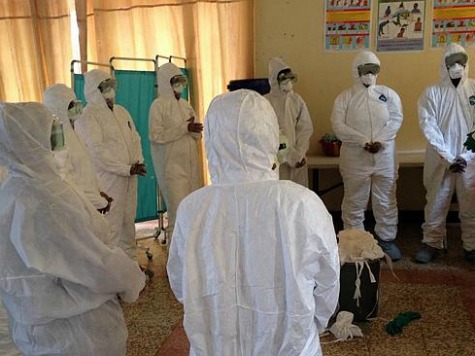A suspected Ebola case on Australia’s Gold Coast has raised concerns that the virus’s spread across West Africa is not only incapable of being sufficiently contained, but it is a threat to every nation, including those half a world away.
Xinhua has reported that a 25-year-old man who had worked as a miner in the Democratic Republic of Congo was being tested for the deadly virus at the nation’s Gold Coast University Hospital and was “seriously ill.” Other outlets, including the Brisbane Times, corrected the man’s age to 27 and noted that despite his illness upon returning from the Congo, doctors treating him warned that there were very few signs that the man may have contracted Ebola. “The gentleman has no symptoms suggestive of the [E]bola virus disease, but we’ve decided to send off some blood samples for testing, and we’ll get those results later tonight,” said Queensland chief medical officer Jeannette Young.
Indeed, authorities announced that the man tested negative for Ebola Thursday. Doctors noted that his symptoms were “flu-like,” and thus they were unlikely to have been caused by Ebola, but the speed at which the virus can incubate, appear prominently on a person, and become contagious caused significant alarm in those testing him. The Australian notes that another factor triggering the commotion was the fact that authorities could neither immediately track the man’s travels from the Congo to Australia nor confirm that he had not been in a West African region affected by the virus.
This inability to immediately track those entering and exiting the country who could possibly have been in contact with the Ebola virus has triggered a strong response from the Australian government, which has established a designated hospital to treat any incoming Ebola cases and prepared hazardous material equipment to keep medical personnel safe. “As long as they’re identified and quarantined, the outbreak will be prevented,” explains Professor Roy Hall of the Australian Infectious Diseases Research Centre. “There wouldn’t be a problem with medical staff getting infected.” Procedures in use in Australia, authorities note, reflect recommendations from the World Health Organization (WHO).
The lengths to which the Australian government is going to keep the virus from spreading on the continent highlights many experts’ belief that this outbreak has the potential to become a worldwide pandemic. While these efforts should help Australians feel safe from the threat of such a disease, the focus on keeping Ebola out of the country, while not fighting it where it has already spread, has led to much criticism–from international health organizations to wealthy countries that could have an impact in West Africa.
The World Health Organization has called the outbreak an “international health emergency,” noting that the affected countries–Liberia, Guinea, Sierra Leone, Nigeria, and Senegal–have insufficient medical personnel and infrastructure to handle the cases coming in, which currently top 4,000. Adding to the panic in the international medical community is the fact that, according to Doctors Without Borders officials, the response from states to the outbreak has been “almost zero,” as nations are protecting themselves from the disease but not helping to contain it.

COMMENTS
Please let us know if you're having issues with commenting.